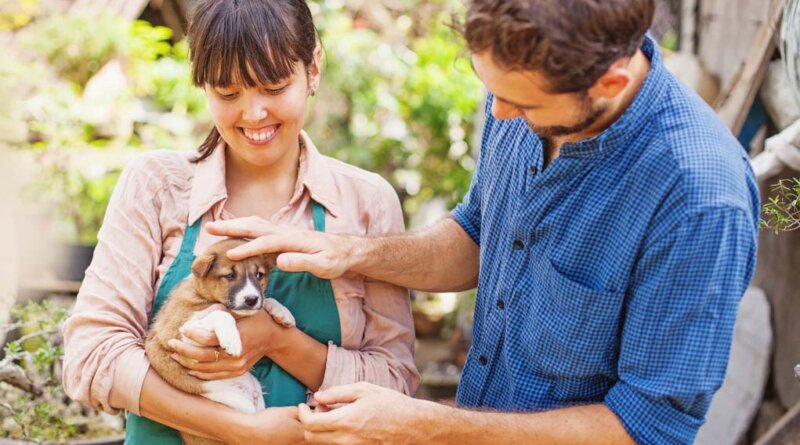Adopting A Dog That Fits Your Lifestyle – Top Dog Tips

That means that families are settling in and getting back into their old routines.
This is the time of the year for families to begin thinking about bringing home a new (or first) pet.
Many potential pet parents think they should pick a dog they like and then conform to his lifestyle or train him to conform to theirs.
That’s not how it works. This week I wanted to share some information with you all about adopting a dog that fits your lifestyle, so you are sure to make the right choice the first time.
Did you miss last week’s column on the harmful additives in commercial dog food?
Nothing is more heartbreaking to me than to see a family that needs to give up their dog.
Whether they bring him back or surrender him to a local shelter or try to re-home him with a new family, it is hard for the dog, and it’s a tough decision for the family, which leaves both parties frustrated and heartbroken.
If you do a little research and make a wise decision the first time, you won’t have to worry about this happening to you.
There are a lot of things to think about before bringing a dog or puppy into your home.
You need to evaluate your lifestyle and your home environment to make sure that your situation is adequate to give a dog the time and space that he will need.
You need to select a breed that will fit in with the lifestyle that you have to offer.
If you live a busy, active lifestyle and you select a breed that requires a lot of human affection, you could end up with a destructive pet that suffers from separation anxiety when left alone for long periods of time.
You may also live a more laid-back lifestyle that involves spending relaxing afternoons in the comfort of your home.
If you select a breed that has a lot of energy and requires plenty of exercises, you may become frustrated with keeping up with its needs.
Things to Consider before Adopting A Dog
I found this great article from positively humane, inc. that explains the importance of choosing a breed that will fit in with your lifestyle. They highlight many of the things that you should think about before adopting a dog or puppy, and the author also makes some suggestions for potential pet owners to research on their own.
Can I Afford to Have a Puppy or Dog?
According to the Humane Society of the United States, $248 is the average annual amount spent on veterinarian bills. This does not include the amount of money spent on food, treats, toys, or crates, the amount of money spent on professional training, or the amount of money spent on grooming and care.
Puppies and senior dogs require substantially more vet trips than adolescent or adult dogs, so it is important to factor in the age of your prospective dog.
Do I Have Other Animals?
Some breeds are territorial and more likely to be alphas, while other breeds are friendly to other animals. Consider the aggressiveness or passiveness of the dog you wish to adopt, the genders of your other pets/dogs, as well as the unique personalities of the animals you already have.
I’ve always had female dogs.
I’m not sure why, I grew up with male dogs and never had any issues, but since I’ve been a dog owner I’ve only ever had females.
I’ve never had to think about the effects of gender when bringing a new dog into my household, but you may need to.
This article on the Canidae Pet Food website talks about this topic, and I found it very interesting.
Author Langley Cornwell explains the importance of gender when bringing a second dog into your household and why you should be concerned. I don’t think this is something that many pet parents think about, and this article is definitely an interesting read.
When two dogs of the same sex live in a household together, they are required to decide which one will be the top dog and which one will be the bottom dog. The ‘decision-making’ can become nasty and even violent.
The ultimate pecking order can have an undesirable effect on both of the dog’s personalities—one of the dogs can become dominant to an unhealthy degree and the other can be pushed so far into submission that it’s not good for him.
In this common scenario, the top dog becomes tyrannical and the bottom dog lives a nerve-wracking life of perpetual submission.
This is an unyieldingly stressful set of circumstances for the entire household.
I also found a great guide to choosing the right dog from veterinarian Ron Hines. Not only does he give tips on choosing the right dog, but he also touches on how to select a puppy for adoption.
It’s important to choose a reputable breeder, and Dr. Hines explains what to look for while puppy shopping.
He also gives potential pet parents some breeds to think about based on what kind of dog they are looking for.
What External Purpose Will They Serve?
You need to consider if the breed will be used for some other reason outside of being a pet.
Are you looking for a bird dog to take hunting with you? If that is the case then a chihuahua might not be the best option for you.
Maybe you are a police officer or some other law enforcement and you need a working dog breed?
Some people want dogs to be guard dogs. And the name of these dogs are just what their name implies. They guard you and your children from perceived threats by biting.
A good-tempered dog of this class will differentiate the mailman, garbage man, your guests, relatives, your children’s wild playmates, and veterinarian from burglars,. Unfortunately some make the wrong decision.
If they are a working dog then you need to consider the working dog breeds, say for example, a Boxer. You need to be strongly assertive and in charge of these breeds, so they look to you for decisions regarding strangers.
If your wife or husband is passive or submissive to dogs, do not purchase one of these breeds. Passive or submissive people rarely overcome this problem by attending dog obedience school.
Regardless, this is something
If you’re looking for additional information on how to select a responsible breeder, check out our column about where to buy a dog. The author explains how to select a reputable breeder and things you should be looking out for a while visiting your puppy.
When adopting a dog, you also need to think about the other members of your family.
They are a large part of your lifestyle, and they’ll be a large part of your dog’s life as well.
What if you have kids?
You really can’t just bring any dog into your home and expect them to tolerate your children.
Children and dogs are both very unpredictable beings, and mixing the two together can sometimes result in disaster.
If you have children in your household or your dog will be around children frequently, you need to take special care when selecting a dog or puppy.
This article in The Whole Dog Journal explains what you should consider if you have children, if you’re pregnant, or if you’re thinking about having children in the near future. It offers some great information for parents of human and canine children.
Ideally, a couple starts laying the groundwork for a canine/human blended family when Junior is just a gleam in the future parents’ eyes. They’re not pregnant yet – in fact, they aren’t planning to add to their family any time soon – but they know they want kids someday. They don’t even have the dog yet! But as they research their canine adoption options, the forefront in their minds is the fact that they want a dog who will be good with kids when they do eventually add that human puppy to the family.Couples who want to have children within the next 16 to 18 years might be wise to avoid adopting dogs of any of the tiny toy breed dogs such as Chihuahuas, Yorkshire Terriers, and Pomeranians. I’m sure there are toy breed dogs who do just fine with young children in their homes. But keep in mind that most of these dogs are tiny, fragile, and sensitive – not ideal companions for humans who will be uncoordinated for a number of years!
The Association of Professional Dog Trainers also offers an interesting article with great information for current or future parents who are considering bringing a dog into their home. This article isn’t as detailed, but it still offers a lot of great pointers and things to consider, and it’s a quick read.
Many families with young children choose a puppy believing they are safer, easier to train, and more adaptable than older, larger pets. But this isn’t always true. Because puppies are fragile, require much more time and care, and are prone to play-related scratching and biting, they may not be appropriate for homes with young children.
Most families’ best choice is to look for a young adult dog who has previously lived successfully with children. Look for a dog who obviously LOVES kids and not merely tolerates them.
I know many families with dogs known as “aggressive breeds,” and they have never had a problem. These families have small children, and the dogs adore them. If you’re interested in adopting one of these stereotyped breeds (like Rottweilers or pit bulls), check out this article. Now, I know this can be a hot-button issue for many people, but I agree with the author of this blog from Rover Blog who takes this point of view:
- The bottom line? The traits that make people think a certain breed of dog is dangerous are the same traits that could make them quality family dogs: Their unwavering loyalty, incredible intelligence, and protective nature.If treated right and with respect, each and every one of these lovable breeds could be the perfect choice for a family. No matter what, it’s important to find a dog who’s a good fit for you and your family. So do your research, give your dog love and training, and find a friend who’ll be your perfect match.
The author makes some great points about some of the more commonly “aggressive” labeled breeds, and I also really enjoyed looking through the comments on this article. Not everyone agreed with the author, but I find it interesting to read other peoples’ opinions.
Another thing you’ll need to consider when deciding to adopt a dog is whether you’d like to purchase one from a responsible breeder or adopt one from a shelter. I’m a huge fan of shelter dogs, and I always encourage new pet parents to adopt from their local rescue organization or animal shelter. If you’d consider it, I’m sure you will find a great dog, and the organization that you adopt will help you find a canine that will fit in well with your family, lifestyle, and home environment.
Dogtime.com wrote an excellent article about making a choice to adopt a shelter dog. They also offer some great advice on what questions to ask at the shelter and what things you’ll need to be sure of before you agree to give the dog a loving home.
Questions to Ask A Shelter
Shelters that focus more on animal control than adoption may know very little about the dogs. And an employee who hopes to save a dog who’s tugging on her heartstrings may not give you the full story. Still, these are questions worth asking.
Why Is the Dog Here?
A stray is an unknown, but if a dog was given up, you’d want to know why. It may have nothing to do with the dog — a move, a divorce, an allergy — or it may be a behavior problem. Behavior problems are often treatable, but it’s good to know about them upfront.
Does the Dog Have Any Known Medical Issues?
It’s better to know in advance if you’ll be facing large vet bills.
What’s the Best Thing About This Dog? What’s the Worst Thing About This Dog?
You’ll learn more than if you simply ask if a dog is nice or well-behaved.
Has the Dog Been Temperament Tested?
Temperament tests try to gauge a dog’s personality and catch red flags such as object guarding and aggression. But take the results with a grain of salt: they’re more a snapshot of a dog’s behavior at the moment of the test than a lifetime guarantee.
Dog trainer Jolanta Benal offers some great tips for choosing a rescue dog on her blog for QuickandDirtyTips.com. The tips are certainly quick, but they’re well written and certainly worth considering.
Consider how much time you have to spare. Housetraining doesn’t take forever, but it’s a lot of work. Almost all puppies and young dogs need plenty of exercises. Manners training calls for much up-front time, attention, and consistency. As for grooming, you’ll be doing that or paying for it throughout your dog’s life.
The choice between high and low maintenance is a lot less trivial than it might seem. Feel like you don’t have a lot of time and energy to invest? That’s fine: older, quiet, short-coated dogs need homes too.
How to Decipher Dog Descriptions When Adopting A Dog Online
This blog on 3LostDogs.com gives a very extensive guide for choosing the right dog from a shelter. If you’re considering rescuing a shelter dog or bringing home a dog from a rescue organization, I would definitely suggest reading this blog post.
The author gives tips on selecting the right shelter, choosing the right dog, and even a guide for getting to know your new pet.
Most shelters are great at providing detailed descriptions of their dogs. But sometimes you have to read between the lines.
“A one-person dog.”
“Would make a good guard dog.”
“Takes a while to warm up to people.”
This is a shy or potentially fear-aggressive dog.
“Still has that puppy energy!” “Boisterous.” “Energetic.” “Easily excited.”
Translation: this dog is a hyperactive pain in the ass. Probably best for someone looking for a working/sports dog.
“Best for an owner who is home all day.”
A tendency toward separation anxiety?
Destructive if left unsupervised?
There is usually no intent to mislead on the part of the people writing these descriptions.
They may be completely accurate, and they may be perfectly good dogs, but always dig deeper.
Ask exactly what they mean by “a one-person dog.” Ask exactly what behavior has been observed.
If you’re not convinced that adopting a dog is right for your lifestyle or for your family, do some additional research and check out this article too! It’s from HelpGuide.org, a nonprofit guide to mental health and well-being.
The Health Benefits When You Adopt a Pet
It is all about the health benefits of pets. I love this article! I am a firm believer that having pets benefits your mental and physical health, and I was so happy to read this article.
Seeing all these health benefits may just convince you to change your mind about pet ownership:
Adopting healthy lifestyle changes plays an important role in easing symptoms of depression, anxiety, stress, bipolar disorder, and PTSD.
Caring for a dog can help you make healthy lifestyle changes by:
Increasing Exercise
Taking a dog for a walk, hike, or run is fun and rewarding ways to fit healthy daily exercise into your schedule.
Studies have shown that dog owners are far more likely to meet their daily exercise requirements—and exercising every day is great for the animal as well.
It will deepen the connection between you, eradicate most behavior problems in dogs, and keep your pet fit and healthy.
Providing Companionship
Companionship can help prevent illness and even add years to your life, while isolation and loneliness can trigger symptoms of depression.
Caring for a living animal can help make you feel needed and wanted and take the focus away from your problems, especially if you live alone.
Most dog and cat owners talk to their pets; some even use them to work through their troubles. And nothing beats loneliness like coming home to a wagging tail and wet kisses.
Closing Thoughts
If you think adopting a dog or purchasing a puppy is in your near future, be smart about your decision.
Dogs are returned or surrendered to animal shelters and rescue organizations every day because they didn’t fit in with their adoptive parents’ lifestyle.
Not only can that be traumatizing for a dog, but it isn’t a decision that you want to have to make.
Think about your needs and what kind of dog would fit in best with you and your family’s lifestyle.
Once you find a potential dog, do some research on the breed, consider the dog’s age, and ask a lot of questions about his personality.
Taking the extra time to get to know a dog could be the difference between finding your forever friend or feeling obligated to care for a pet that doesn’t make you happy. You don’t deserve that, and neither does the dog.
It’s up to you to be a responsible pet parent, and that starts before you even bring your new companion home.





canadian pharmacy pain meds https://fastpills.pro/# mexican pharmacies that ship
[url=https://valacyclovir.gives/]valtrex gel[/url]